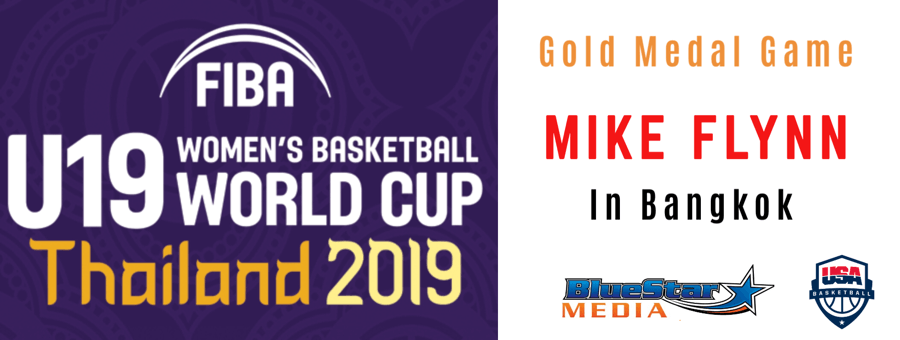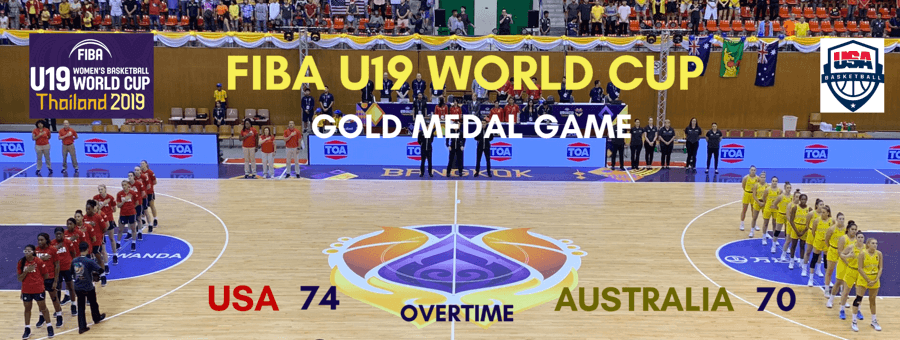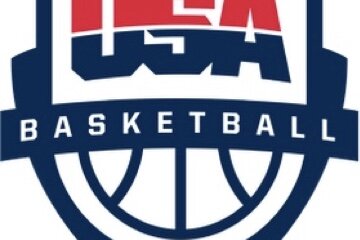BANGKOK, Thailand – Nail biter game, yes. Another win – this time in OT, yes. Another FIBA World Cup gold medal and yes it was “street ball” brutal to get to the podium at the Thai-Japan Arena. The USA Junior National Team won its second matchup of the FIBA U19s against Australia getting a huge 74-70 overtime win in the finale. It wasn’t pretty but it was just enough.
Both teams came out fast utilizing pressure up and down the floor with Australia playing zone forcing the USA into tougher outside shots and double-teaming inside. That approach led after to a first quarter 23-22 lead as Isolbel Anstey got a quick 12 points inside. USA stormed back to a great but short lived lead still trailing at the half 40-39. The Americans were not used to the open floor hits and pushes on the baseline. No harm, no foul prevailed. Nothing changed in the third quarter as both teams headed into the final frame tied at 53 all setting the stage for the final minutes of the fourth quarter.
Australia was up 5 with 2:43 left to play but the USA got it down just 1 at 2:12 mark. Two missed USA shots and a turnover later the Americans were facing a 3-point deficit with only 23 seconds remaining. With the game looking lost, the USA pressed and the ball went up the floor to Anstey who was fouled by Rhyne Howard. However, Antsey swung her elbow to Howards face for a technical foul with :17 left. Guard Caitlin Clark stepped to the line to make one leaving the USA down 66-64. A backdoor inbounds pass from Paige Bueckers to Hailey VanLith tied the game at 68 each with :12.5 on the clock.
Australia advanced the ball after the Americans tied the game but a swarming USA defense kept Australia from scoring in the final 12 seconds to deny them the win and forcing overtime.
Going to overtime impacted both teams as they missed foul shots, baskets and turned the ball over. With the game still close, Rhyne Howard’s second big-time shot of the tournament (the other being a big 3-point shot in the final moments of the close win over Belgium in the semifinals) loosened things up. A Michael Jordan-like step-in and push off back foot jumper gave the USA a 72-68 lead with 2:02 to play in overtime. In effect this was the game winning dagger. A crushing game for Australia and another gutsy win for the USA.
FIRST GAME: The USA opened their FIBA U19 pool competition with a 79-56 win over Australia marking the Gems their first and last games of the tournament. Paige Bueckers was the leading scorer in the opener getting 11 points as the Americans placed 4 other players in double figures with 10 each. Lily Scanlan (12pts) and Jazmin Shelly (11pts) were the Aussie stars of that game. Anstey scored only 4 points.
LAST TIME: The USA claimed their 8th FIBA U19 championship since 1985. They avenged their silver medal finish in 2017 where they lost to Russia, who did not qualify for this year’s event, 86-82. Canada won the bronze that same year beating Japan 67-60. Both teams did not did not duplicate that success this time around.
BRONZE: Spain (6-1) rebounded from their tough loss to Australia (5-2) to claim the bronze medal over Euro foe Belgium (5-2) 58-52. Both teams faced each other last year in the FIBA Euro U18 quarterfinals where Belgium got a one-point victory. Spain was led by Lola Pendande 14 points and got 18 bench points and 13 offensive rebounds as a team.
OTHER GAMES: China (5-2) played strong enough to beat a young, still-developing Canada (4-3) group 72-64. Mali (2-5) only won 2 games but still surprised many by being competitive in most games claiming 7th place after their 65-62 win over Japan (3-4) and garner its highest finish ever at the U19s. South Korea (3-4) beat a struggling Hungary (3-4) 73-66 for 9th place. Colombia (3-4) edged its FIBA Americas rival Argentina (2-5) 58-51. Another disappointing Euro team, Germany (2-5), got past an injury decimated Latvia (4-3) 71-55 for 13th place. The other African entry, Mozambique (2-5), also won two games in its first U19 tournament to finish in 15th place by crushing host Thailand 68-38.
ALL-TOURNAMENT TEAM: Billie Massey (Belgium), Alexandra Fowler (Australia), Lola Pendande (Spain), Rhyne Howard (USA) and MVP Paige Bueckers (USA) who led the tournament with 5.4 assists a game.
FINAL THOUGHTS: This was a well run, greatly organized event by FIBA Asia and host Thailand which many hope will continue to bid for other FIBA World Cup events. The overall talent level by the teams was not on a par with FIBA U19 events in Lithuania (2013) or Russia (2015) where players like Breanna Stewart and A’ja Wilson brought star power to those competitions. Many observers noted how much weaker some of the European teams were and also the number of traditional power Federations were not on hand like France, Russia Italy and Brazil.
In speaking with a variety of people, this wasn’t the best USA team that could’ve been selected since a number of college freshman did not answer the call. Some were doing so at the wishes of their college head coach while others really didn’t want to miss college summer school and the chance to acclimate to the new college setting and teammates. Another quiet discussion was the missing impact of Azzi Fudd on the USA roster. Fudd was the backcourt mate to Bueckers (’20) for the USA U17 World Cup gold medal winner in Minsk last year. It was expected for Fudd (5-10, ‘21) to make this team before her stunning season ending injury at the USA U18 3X3 National finals in Colorado Springs in April.
The shooting here was horrible with so many teams just jacking up shots and missing layups to the point some questioned the actual inflation level of the basketball itself. Only two teams, Korea (74.5%) and Japan (70.1%), shot over 70% from the foul line while, at the same time, not one team shot higher than 30% from the 3-point line. Australia led the event with 29.9% from deep while the USA was second with at 29.5%. Host Thailand, which finished last with 0-7 record, was 10th in 3-point shooting at 25% while Mali, with Koné, managed 2 wins but was in many games despite their tournament lowest 3-point percentage of 19%. There were 47 double-doubles and no triple-doubles. The USA led the tournament in scoring with 564 points while Hungary was 2nd with 498 points.
The flat out best player here was Mali’s 6-3 forward Sika Koné who led the tournament with a double-double average of 15.1 points and 13.9 rebounds per game. Koné punched out a double-double last year at the U17’s for Mali who finished in 10th spot. Latvia’s Laura Meldere also averaged a double-double with 15.0 points and 10.3 each time out.
There were a number of USA college coaches in attendance viewing not only current and future players but also potential recruits from other nations.
Mike Flynn is owner and operator of Blue Star Basketball and U.S. Junior Nationals. He is a National Evaluator and publishes the Blue Star Report which ranks the top 100 high school girls basketball players in the nation. He also serves as Secretary of the Middle Atlantic District AAU, National Chair for AAU Lacrosse, Consultant to Gatorade for girls basketball, member of the McDonald's All–American selection committee, & Consultant for Nike Global Basketball.







